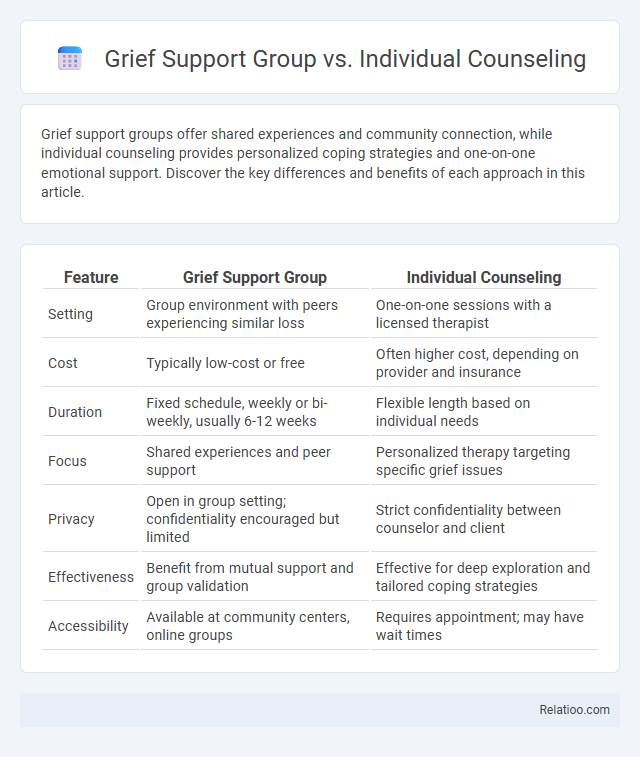Grief support groups offer shared experiences and community connection, while individual counseling provides personalized coping strategies and one-on-one emotional support. Discover the key differences and benefits of each approach in this article.
Table of Comparison
| Feature | Grief Support Group | Individual Counseling |
|---|---|---|
| Setting | Group environment with peers experiencing similar loss | One-on-one sessions with a licensed therapist |
| Cost | Typically low-cost or free | Often higher cost, depending on provider and insurance |
| Duration | Fixed schedule, weekly or bi-weekly, usually 6-12 weeks | Flexible length based on individual needs |
| Focus | Shared experiences and peer support | Personalized therapy targeting specific grief issues |
| Privacy | Open in group setting; confidentiality encouraged but limited | Strict confidentiality between counselor and client |
| Effectiveness | Benefit from mutual support and group validation | Effective for deep exploration and tailored coping strategies |
| Accessibility | Available at community centers, online groups | Requires appointment; may have wait times |
Understanding Grief: Group vs. Individual Support
Understanding grief involves recognizing how different support options can impact your healing process. Grief support groups offer communal sharing and collective empathy that fosters mutual comfort through shared experiences, while individual counseling provides personalized guidance and tailored coping strategies from a mental health professional. Your choice depends on whether you benefit more from collective support dynamics or focused one-on-one therapeutic intervention.
Key Differences Between Group and One-on-One Counseling
Grief support groups provide a communal environment where individuals share experiences and receive peer validation, fostering a sense of belonging and collective healing, while individual counseling offers personalized, one-on-one therapy tailored to specific emotional needs and coping strategies. Group settings emphasize mutual support and shared learning, beneficial for social connection and reducing isolation, whereas individual counseling allows deeper exploration of personal grief patterns with targeted interventions by a licensed therapist. The key differences lie in the interaction type, level of privacy, and the degree of individualized attention, impacting the therapeutic approach and outcomes in grief processing.
Benefits of Grief Support Groups
Grief support groups offer a unique environment where Your shared experiences with others facing similar losses foster understanding and emotional healing, creating a sense of community and belonging that individual counseling may not provide. These groups facilitate mutual encouragement, reduce feelings of isolation, and help participants develop coping strategies through collective wisdom and empathy. Unlike individual counseling, support groups often provide ongoing peer support, which can be crucial for long-term grief management and recovery.
Advantages of Individual Grief Counseling
Individual grief counseling provides personalized, one-on-one support tailored to the unique emotional needs and experiences of the grieving person, fostering a safe environment for deep exploration and healing. Unlike grief support groups, individual counseling offers confidentiality and the flexibility to address complex issues such as trauma, depression, or anxiety that may accompany grief. This targeted approach enhances coping strategies and emotional resilience through specialized therapeutic techniques guided by a licensed mental health professional.
Who Should Choose a Support Group?
Individuals seeking connection with others experiencing similar loss should choose a grief support group, as it offers shared understanding and communal healing. Those who benefit from open dialogue and collective empathy find support groups effective for processing emotions and reducing isolation. Your choice to join a support group is ideal if you value peer support and learning from diverse coping strategies in a safe, group setting.
When Is Individual Counseling More Effective?
Individual counseling is more effective when your grief involves complex emotions, trauma, or requires a personalized approach tailored to your unique psychological needs. Unlike grief support groups that provide community and shared experiences, individual counseling offers one-on-one professional guidance, allowing for in-depth exploration of your feelings and coping strategies. This approach is ideal when you need focused attention to process grief, address underlying mental health issues, or develop specific tools for healing.
Core Components of Support Groups for Grief
Core components of support groups for grief include shared experiences, emotional validation, and peer empathy, fostering a sense of community and belonging that reduces isolation. Unlike individual counseling, support groups emphasize mutual support and collective coping strategies, allowing participants to learn from others' grief journeys. Structured group sessions often incorporate guided discussions and activities aimed at normalizing grief responses and promoting resilience.
Personalized Approaches in Individual Grief Therapy
Individual grief therapy offers personalized approaches tailored to the unique emotional needs and coping styles of each person, ensuring deeper exploration of personal loss. Grief support groups provide shared experiences and collective empathy, which can benefit those seeking community and peer understanding. Compared to group settings, individual counseling allows for focused, private processing and customized therapeutic techniques that address specific grief challenges.
Factors to Consider When Selecting Grief Support
Choosing between a grief support group, individual counseling, or self-guided grief work depends on factors such as the intensity of emotional distress, personal comfort with sharing, and the need for professional intervention. Individuals experiencing complex grief reactions may benefit more from licensed individual counseling, which offers tailored therapeutic approaches and confidentiality. Those seeking community connection and shared experiences might find grief support groups advantageous, while self-guided grief can supplement these options but often requires strong self-motivation and coping skills.
Integrating Support Groups and Individual Counseling
Integrating support groups and individual counseling offers a comprehensive approach to grief by combining shared experiences with personalized guidance, maximizing emotional healing and resilience. Support groups provide collective empathy and community connection, while individual counseling addresses unique psychological needs and develops tailored coping strategies. Your recovery process benefits from this dual approach, enhancing both social support and introspective growth.

Infographic: Grief Support Group vs Individual Counseling
 relatioo.com
relatioo.com